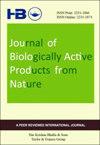Anti-hyperlipidemic and Antioxidant Potential of Phenolic Monoterpenes Rich Thymus satureioides Coss. Volatile Oil
IF 1
Q4 CHEMISTRY, MEDICINAL
Journal of Biologically Active Products from Nature
Pub Date : 2023-11-08
DOI:10.1080/22311866.2023.2277899
引用次数: 0
Abstract
AbstractThis work aims to evaluate the antioxidant and lipid-lowering effects of the essential oil of Thymus satureioides and its main compounds. The profile of volatile phytochemicals was determined by gas chromatography-mass spectrometry (GC/MS). Total phenolic compounds estimation and antioxidant activity assessment have been evaluated according to the literature models and the anti-hyperlipidemic activity was evaluated using triton wr-1339 induced hyperlipidemic rats model. Our findings revealed that thymol (26.6%) and carvacrol (25.9%) were the most abundant volatile constituents. Furthermore, the essential oil was found to be rich in phenolic components (6.50 ±0.14 GAE mg/g EO) and exhibits significant antioxidant potential (DPPH IC50=25.02 mg/mL; ABTS IC50=0.87 mg/mL). Additionally, the volatile oil displayed a potent lipid-lowering potential by reducing the levels of triglycerides (-68.78%), cholesterol (-36.34%), and non-HDL-C (-38.44%). This effect can be explained by its richness in thymol and carvacrol, which demonstrated a comparable anti-hyperlipidemic effect to that of simvastatin. We conclude that Thymus satureioides is a natural producer of lipid-lowering agents that can be used as a potential natural alternative treatment for managing hyperlipidemia.Keywords: Thymus satureioidesvolatile oilthymolcarvacrolhyperlipidemia富含酚类单萜的胸腺草抗高脂血症和抗氧化潜力。挥发油
摘要本研究旨在探讨胸腺挥发油及其主要化合物的抗氧化和降脂作用。采用气相色谱-质谱联用(GC/MS)法测定植物挥发性化学物质。采用文献模型评价总酚类化合物含量和抗氧化活性,采用triton wr-1339诱导的高脂血症大鼠模型评价其抗高脂血症活性。结果表明,百里香酚(26.6%)和香芹酚(25.9%)是最丰富的挥发性成分。此外,挥发油富含酚类成分(6.50±0.14 GAE mg/g EO),具有显著的抗氧化潜力(DPPH IC50=25.02 mg/mL;ABTS IC50=0.87 mg/mL)。此外,挥发油通过降低甘油三酯(-68.78%)、胆固醇(-36.34%)和非高密度脂蛋白c(-38.44%)的水平显示出有效的降脂潜力。这种效果可以通过其丰富的百里酚和香芹酚来解释,这表明了与辛伐他汀相当的抗高脂血症作用。我们的结论是,类饱和胸腺是一种天然的降脂剂的生产者,可以作为治疗高脂血症的潜在天然替代治疗方法。关键词:胸腺;类饱和胸腺;挥发油
本文章由计算机程序翻译,如有差异,请以英文原文为准。
求助全文
约1分钟内获得全文
求助全文
来源期刊

Journal of Biologically Active Products from Nature
Agricultural and Biological Sciences-Agricultural and Biological Sciences (miscellaneous)
CiteScore
2.10
自引率
0.00%
发文量
21
 求助内容:
求助内容: 应助结果提醒方式:
应助结果提醒方式:


